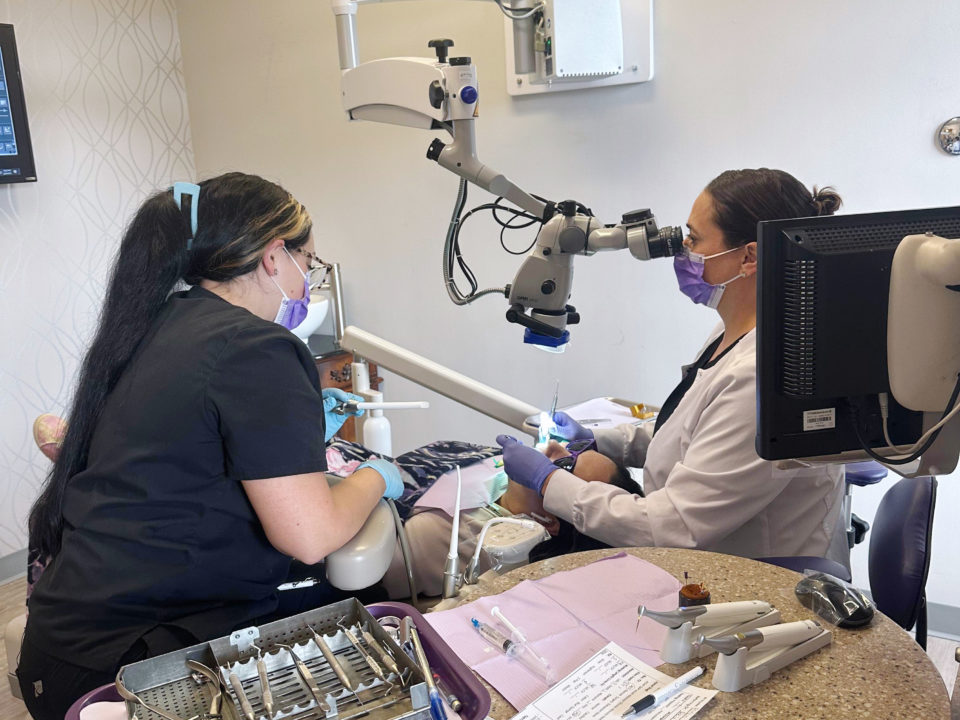
What Can I Eat After a Root Canal?
July 11, 2022
Meet Dr. Weightman A Top Endodontic Specialist In Charleston
July 27, 2022
What Can I Eat After a Root Canal?
July 11, 2022
Meet Dr. Weightman A Top Endodontic Specialist In Charleston
July 27, 2022Fear of the dentist is very common; even specific treatments will cause anxiety in people. One common procedure people fear is root canal therapy. Reasons for root canal anxiety may stem from myths about pain or not knowing what will happen during the procedure. If you need a root canal, don’t let your fear get in the way.
Our Innovative Endodontics team has gathered these seven tips to help you to ease your anxiety and get the endodontic care you need.
1. Learn What to Expect During Root Canal Therapy
Fear of the unknown can make root canals seem more frightening than they are. In fact, many people don’t know what happens during this procedure. By learning what to expect, you may help ease the anxiety that stems from not knowing.
When you have root canal therapy, the endodontist will take images of your mouth to see the affected tooth and plan how to approach the treatment. They will then prepare you with a dental dam used for endodontic treatment that isolates your tooth and keeps tools and bacteria from falling into your mouth. You will also have your tooth numbed with a local anesthetic. The needle for this causes a slight pressure or stick feeling, but after it starts to numb the area, you will not feel anything during the procedure.
The endodontist will proceed similarly to that your dentist uses for a cavity, but the treatment for a root canal goes deeper into the tooth. They drill into the tooth to give them enough room to insert the tools used to clean the pulp, infected matter, and debris from inside the root canals. After completely cleaning out the canals, they will seal the tooth’s interior and fill it. Because the endodontist treats the canals that house the pulp and tooth nerve, they have extra discomfort prevention and relieving treatment to ensure your comfort.
If a molar is treated, you may need to visit your dentist after the root canal for a crown to strengthen the treated tooth and prevent complications.
2. Talk to the Endodontist Before the Procedure
Before the procedure, talk to the endodontist and let them know your concerns. They will tell you if they have any communication methods during the treatment.
For instance, Dr. Estes allows patients to raise a hand during endodontic procedures to let her know to stop and give them a break. She is also open to answering patients’ questions about their root canal treatment.
3. Relief After the Treatment
Most people have some discomfort in their affected teeth before a root canal. This discomfort comes from inflammation inside the canals, which the root canal removes. The procedure will stop the cause of your discomfort without losing a tooth. When you begin to feel afraid of your procedure, think about how much better you will feel after the root canal site heals.
Healing only takes a few days, and in the meantime, you will only have minor discomfort or tenderness in your tooth. Over-the-counter medicines, such as Tylenol and Advil, can help ease your discomfort.
4. Take Care of Your Body and Mind Before and After the Root Canal
Take care of yourself before and after the root canal. Focus on giving yourself good food, fitness, and relaxation. You can ease some of the anxiety by thinking about other things in your life and taking care of your mind and body.
5. Work on Self-Soothing Techniques to Use During the Procedure
Find ways to self-soothe during the root canal. These methods vary depending on individual preferences and beliefs. Some people may choose silent prayer, while others opt for deep breathing exercises. Meditation is another option that could help you relax in the time leading to your root canal or if you feel anxiety during the procedure.
6. Listen to Comforting Music During the Root Canal
Bring earbuds or noise-canceling headphones and listen to your favorite music during the procedure. Find your favorite songs or podcasts to listen to. Active listening will give your mind something else to focus on other than anxiety. Plus, the music will help dull any sounds from the endodontist’s equipment.
7. See an Endodontist with Good Chairside Manner
Make sure to visit an endodontist with experience in helping patients who experience root canal anxiety. Chairside manners are very important in how comfortable you feel about the procedure. Because Dr. Estes wants people not to be afraid of endodontic care, she works especially hard to help each patient feel that they will receive good treatment from someone concerned about their emotional and physical feelings.
8. Talk to a Therapist or Psychiatrist for Severe Phobias
Phobias are intense fears that may prevent you from doing the thing you fear. For instance, if you have root canal anxiety, you may feel fear but still can follow through with the procedure. Severe phobias may keep you from even making a dental appointment if you think you might need root canal therapy. Phobias and severe anxiety typically require extra help to deal with.
Talk to a therapist to see if you can find relief through talk therapy. The therapist may recommend a psychiatrist to prescribe anti-anxiety medications if talk therapy alone does not help.
Ease Your Root Canal Anxiety with Our Comforting Team at Innovative Endodontics
At Innovative Endodontics, we aim to help each patient leave with a new understanding of root canals. We want everyone to see root canals as routine, painless, and essential for saving teeth. Dr. Estes and our entire team dedicate themselves to patient comfort from when they come in until they leave. If you have root canal anxiety, our team can help you feel more relaxed before and during the treatment. Contact us today to make an appointment.




